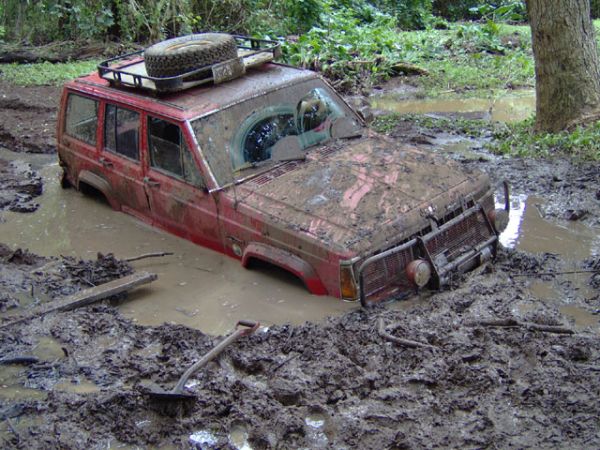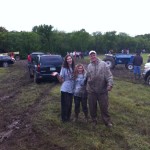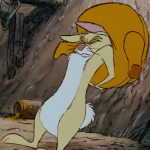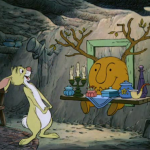
Stuck
In a paralyzing lapse of judgment, a couple of years ago I signed up for one of those gimmicky exercise opportunities, a 5K scheduled for a pleasant spring morning. The Foam Fest, it was called, to be held on beautiful Nashville countryside property. The kicker–the fun part, as I billed it to my kids–was that it was also an obstacle course, with elements like plank walls and ditches. They would be allowed, even expected, to get filthy.
Since the universe frequently uses me for free entertainment, the day of the event the temperature dropped twenty degrees and so began an unrelenting miserably cold drizzle. My offspring cast wary looks at the gray skies and kept glancing at me (“the responsible adult”) to see when I would call the whole thing off. No, no! We would forge ahead! What’s a little rain? It would be refreshing! We could DO THIS.
We fought valiantly. Slogging through ankle deep mud, we cracked our knees on jagged rocks, helped heave and toss one another over the plank walls, and dragged each other through the inner tubes linked in waist-deep water. We shouted encouragement as we army crawled, soaking wet, beneath an electrified mesh net, and we cheered weakly, shaking with hunger, when we spied the finish line. By that time, we were thoroughly soaked, muddy and matted from head to toe, and so freezing cold that none of us could feel our fingers or toes. “Almost there!” I buoyed them. “We’ll get dried off and go get some warm lunch!”
Amidst crowds of hundreds of equally filthy runners, we stood at the back of the van and stripped off wet clothing. Modesty? Decorum? Such words meant little in the face of frostbite and low blood sugar. With the heater on full blast, I started the van to head on toward lunch and a hot shower. We moved exactly two feet. During the race, as the rain poured down, the hundreds of cars parked in the open cow pastures had slowly sunk, thousands of tires sucking into the soft mud below. We were stuck. Even the big, tough four wheel drives were spinning their wheels, mud showering any car within 10 feet.
For the first hour or two, people pitched in, neighbor helping neighbor, as teams pushed the lucky cars out one by one. As each car moved, it left impassable muddy ruts behind, and the situation worsened. We scavenged every stray cheerio and stale granola bar from beneath the seats, grateful it had been months since we last vacuumed the van. As time wore on and the good Samaritans dwindled, people became more  desperate. Two giant tractors were commandeered to pull the vehicles out one at a time. Each time a tractor entered the field, people waved frantically, begging to be next. My husband drove almost two hours to bring us food, tramping across the fields with it hidden in his coat. We fell upon it like savage dogs.
desperate. Two giant tractors were commandeered to pull the vehicles out one at a time. Each time a tractor entered the field, people waved frantically, begging to be next. My husband drove almost two hours to bring us food, tramping across the fields with it hidden in his coat. We fell upon it like savage dogs.
Six. Hours. Six hours after we passed the finish line, the tractor pulled us out to the road to head home. Months later, after multiple car washes, I was still finding mud caked in the door frames of the van and my children shot me withering looks of how could you?! every time anyone brought it up. Now, almost three years later, I think we’ve gotten to the point where we can laugh about it, albeit with a kind of careful, nervous tittering.
No way around it, stuck is tough to take. This is true whether we’re trapped in a muddy field or whether it’s more of a feeling or state that’s got us mired. Our culture adds pressure with demands for constant progress, advancement, transformations, and breakthroughs. So we struggle and strive in what fee ls sometimes like quicksand, unhappy with our “boring” marriage, fed up with our “monotonous” job, or impatient with not being able to “move on” from grief, fear, or anxiety. Or maybe it’s just that we’ve worked forever on our one stubborn character flaw and it never seems to improve. Endlessly treading water can be exhausting. Anger and fear take over and we scream, wail, and fret our way into a tizzy, thinking we’ll use force of will and huge energy reserves to budge the immovable.
ls sometimes like quicksand, unhappy with our “boring” marriage, fed up with our “monotonous” job, or impatient with not being able to “move on” from grief, fear, or anxiety. Or maybe it’s just that we’ve worked forever on our one stubborn character flaw and it never seems to improve. Endlessly treading water can be exhausting. Anger and fear take over and we scream, wail, and fret our way into a tizzy, thinking we’ll use force of will and huge energy reserves to budge the immovable.
But that’s if we look at “stuck” as only inherently negative. What if stuck is the best and simplest way to get our attention? As a new mom, I was shocked when the nurses at the hospital demonstrated swaddling. Take a red-faced, screaming, flailing infant and wrap her snugly in a blanket, her limbs effectively pinned, and she often calms right down, even drifts off to sleep. What is this gypsy magic?!
Turns out, mini baby straight jackets keep babies from being disturbed by their own startle reflex. Hmm. Perhaps we’re wired from birth to need periods of being “stuck” to allow us to calm down, feel the Zen, and cut out the deafening mental chatter that runs  nonstop otherwise. Once we stop holding our breath in panic and resist that urge to gnaw off our own limb rather than face restraint in any form, a sense of calm acceptance takes over, new ideas and creative solutions bubble up from the silence, and the situation may appear totally different–less Pit of Despair and more Source of Revelation.
nonstop otherwise. Once we stop holding our breath in panic and resist that urge to gnaw off our own limb rather than face restraint in any form, a sense of calm acceptance takes over, new ideas and creative solutions bubble up from the silence, and the situation may appear totally different–less Pit of Despair and more Source of Revelation.
Could it be that when we feel the most “stuck” on land, our underground rivers are allowed to course freely, leading to wisdom and a depth of character we would have missed in our bustling path toward progress? If we sit still and surrender to the present situation for a minute, a day, a year, what might we learn?
I’m not saying we should give up or “settle.” The alternative to treading water is not to sink to a watery grave, but rather to float on your back for awhile. If we simmer down and sit with things when we’ve hit a wall spiritually, emotionally, or professionally, taking stock without the fight or flight reflex screaming in our ears, we might be surprised. Stuck can bring a startling peace. Being stuck can help us notice people or resources we had overlooked or dismissed in our flailing. It’s the truth that gets us unstuck, not striving or barreling or flailing. The truth. Oh, and sometimes tractors.

